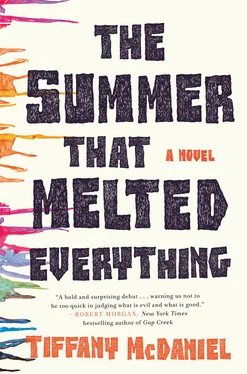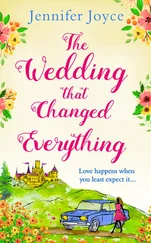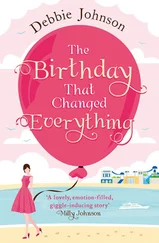“What about Walt Whitman?” Grand asked as Mom reprimanded him for using the tablecloth as a napkin. He apologized to her and asked Sal again about Whitman. “We’re reading him in English. ‘Song of Myself.’ Is he in hell?”
“Walt Whitman?” Sal was on his second roll. “He’s not in hell.”
“I’m surprised. I mean, he writes well enough. I celebrate myself and sing myself and all that, but I heard he was into other guys.” Grand’s voice went off to the side, like crumbs on a counter being wiped away.
“What does that have to with hell?” Sal shrugged.
“I mean, don’t all fags go to hell?” Grand asked it so casually, he might have been asking if there was any more pop.
Dad grabbed his forehead. “What is with all this language today? There is to be no more of it in this house. Do you hear?” He pounded his finger down into the table until the nearby gravy boat shook. “No more words that say something about our own ignorance. Grand, are you listening? Look at me. You are not to say that word again. Grand?”
“All right, Dad. Geez.”
“And not one of you is to use the N-word that horrid woman said tonight to Sal. I swear I wish people were forced to make a list of names and recite them every time they use that word.
“A list of the names of every black man, woman, and child hated, beaten, killed for the color of their flesh. It should be law — by God, it should be law — that if you say that word, you must then say their names.
“No one wants to say one word and then realize it means so many more.” He picked up his glass and took a long drink of water, after which he apologized to Sal for the woman’s wrong. “She was a piece of shit.”
“Autopsy.” Mom was sitting down in her own chair by then, opposite Dad’s at the table. She was smiling. She knew, as we all did, that when Dad spoke profanity, which he so rarely did, it came out funny instead of bad.
“Well, it’s true.” He propped his elbows up on the arms of the chair as he leaned back. “Sometimes this world is like red fences in the snow. There ain’t no hiding who we really are.”
Sal leaned back in his own chair, propping his elbows up like Dad. While Dad had been talking, Sal had been listening carefully. Later that night he would say to me, “I’ve never met a better man than your father. Compared to him, it’s as if all other men are homeless dogs that bed in the mud.”
“Was Walt Whitman the one to write about the road less traveled by?” Mom used her napkin to dab her sweat.
“That was Robert Frost,” Grand answered.
“And he was gay?”
“No, Mom, Walt Whitman was the”—Grand glanced at Dad and swallowed the word he was going to say—“the one who wasn’t into women. Or so they say. But if he’s not in hell, maybe he was straight. Ain’t that whatcha said, little devil?” Grand looked across the table at Sal. “That Whitman’s not in hell?”
“Homosexuality is not flammable. You can’t burn by it alone.” Sal was helping himself to another spoon of green beans.
“Well, they do say it is a sin.” Mom held her glass of ice water to her cheek. “Like my momma used to say, when you play in the thorns, you ain’t gonna get nothin’ but scratched.”
“Hmm-mmm.” Dad scrunched his brow as he buttered his roll. “I think it’s more of a psychological disease. Just something a little off in the mind. They could probably fix it with a little determination.”
“Then there’s this new sickness goin’ around.” Mom clicked her tongue in sympathy. “I feel bad for ’em, I really do, but some say it’s God punishin’ ’em for their lifestyle. Maybe He is, punishin’ ’em, that is. I mean this sickness is from that moment of ’em comin’ together. It makes ya think maybe God is tellin’ ’em to stop comin’ together. Maybe He’s tellin’ ’em to stay apart.” She patted the sides of her neck. “Lordy, this heat has a fury, don’t it?”
Grand leaned to one side, as if the chair he was sitting in was teetering on an edge and he had to shift his weight to keep from falling over. He asked me to pass the salt, though he never actually used it once I gave it to him. He just held it so tight, before setting it down.
“Sal?” Dad lightly drummed his fork against his plate. “I’m interested, if you are the devil, that is, what is hell like?”
Sal quickly swallowed his mouthful of potatoes and briefly wiped his mouth before saying hell is a hallway of doors.
“And behind each door is a suffering of the individual soul. One door I opened was to a man sitting in a desert. There was nothing scary about it. There was blue sky. White fluffy clouds. Rose-colored sands. There were no snakes hissing at him. No scorpions about to sting. The heat nor the sun was a threat. A thornless saguaro shaded him, and he was neither hot nor thirsty, as he had a full canteen by his side, would always have it full and by his side, no matter how much he drank. To someone else, that empty desert might have been paradise, but to that man it was absolute hell.
“Another door opened to a woman in lipstick and a dress that would cost the farm. She was sitting in a room full of flowers and tea and those little frosted cakes. She was holding a beautiful, gold-fringed blanket, cradling it as if it were wrapped around a child. You could hear the child, hear him crying, hear him laughing, hear him sleeping even. But never was he seen. All she could do was to stare into the empty blanket and will continue to do so even after grief becomes a word too small for the feeling.
“Another door opened to a day. The third Wednesday in an October. It was a country festival, the Pumpkin Show, they called it, where thousand-pound pumpkins were being judged and autumn leaves were confetti in the air. No one was crying. No one was sad. No one was noticing the man whose hell this was and who stood in the middle of the largest pumpkin pie ever baked and screamed. He screamed long. He’s screaming still, but no one hears him but himself … and me.
“People think hell is about flames and demons, but I employ no demons. There are fires, yes, each door burns. I’ve started none of these fires, not even the one that burns my own door. And just as I cannot put out my own, I cannot put out theirs.
“I have tried. I’ve carried buckets of water to these doors, but the more water I splash on the flames, the bigger they get and I have to turn away in the throbbing torture of it all. I am not the ruler of hell. I am merely its first and most famous sufferer turned custodian with the key to the gate in my back pocket.”
Mom sighed for us all. “You’re such a sad little boy.”
“That ain’t what I thought hell would be like at all.”
“What did you think it would be like?” Sal turned to me.
“Don’t know. I guess I thought demons. I thought proddin’ with cattle rods. I thought just a lot of blood. The way you describe it, it’s even more frightenin’.”
“You know where the name hell came from.” He crossed his hands on his lap. “After I fell, I kept repeating to myself, God will forgive me. God will forgive me. Centuries of repeating this, I started to shorten it to He’ll forgive me. Then finally to one word, He’ll. He’ll.
“Somewhere along the way, I lost that apostrophe and now it’s only Hell. But hidden in that one word is God will forgive me. God will forgive me. That is what is behind my door, you understand. A world of no apostrophes and, therefore, no hope.”
Our torments also may, in length of time,
Become our elements
— MILTON, PARADISE LOST 2:274–275
A COUPLE YEARS ago, a woman sold me a time machine at a yard sale. It looked like an ordinary window. The wood spiked along its sides, a result of it being hastily and carelessly removed from the house it once sat in. The glass was filthy, and tape was placed over the hairline crack in the bottom pane.
Читать дальше












